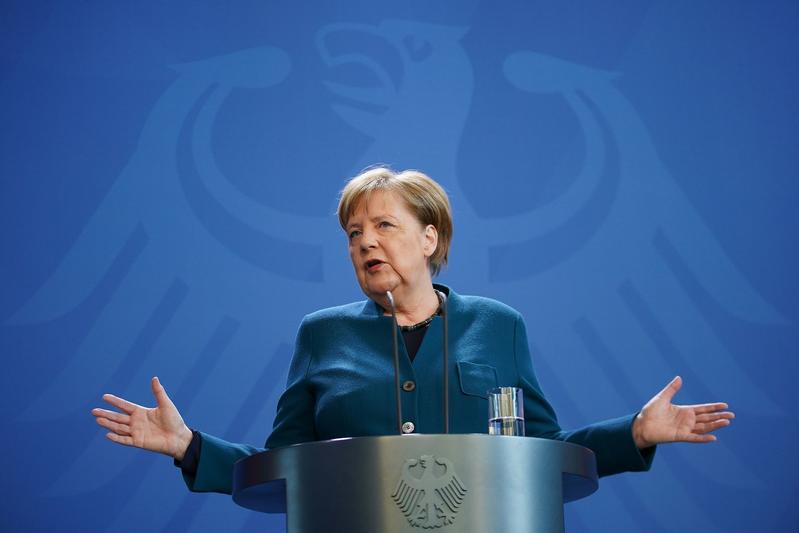 German Chancellor Angela Merkel speaks to the media to announce further measures to combat the spread of the coronavirus and COVID-19, the disease the virus causes, after she held a teleconference with the governors of Germany's 16 states on March 22, 2020 in Berlin, Germany. (CLEMENS BILAN - POOL / GETTY IMAGES VIA BLOOMBERG)
German Chancellor Angela Merkel speaks to the media to announce further measures to combat the spread of the coronavirus and COVID-19, the disease the virus causes, after she held a teleconference with the governors of Germany's 16 states on March 22, 2020 in Berlin, Germany. (CLEMENS BILAN - POOL / GETTY IMAGES VIA BLOOMBERG)
European leaders struggled to agree on a concrete strategy to contain the fallout from the deadly coronavirus, leaving key details to be hammered out in the weeks ahead.
With thousands of people falling ill & hundreds dying every day from the pandemic, the leaders spent much of their time arguing over whether a joint communique would hint at financial burden sharing as a way to repair the damage to their economies
With thousands of people falling ill and hundreds dying every day from the pandemic, the leaders spent much of Thursday arguing over whether a joint communique would hint at financial burden sharing as a way to repair the damage to their economies. Earlier this week, finance ministers had passed the buck to the leaders but the leaders passed it right back. They tasked the finance chiefs with coming up with proposals within two weeks.
A video call was expected to give the green light for the creation of credit lines from the region’s bailout fund to keep borrowing costs low while governments ramp up spending to cushion the impact of the pandemic. But efforts to agree on the exact wording of the common statement ended with a fudge after six hours of talks, as a group of member states including France, Italy and Spain pushed for more radical steps to tackle the economic impact, such as the prospect of joint debt issuance via so-called coronabonds.
ALSO READ: Britain wakes up to coronavirus lockdown, Egypt declares curfew
That call was backed by European Central Bank President Christine Lagarde who warned leaders they were facing a crisis of “epic” proportions. But her appeals fell largely on deaf ears with Germany and the Netherlands, echoing similar divisions during the sovereign debt crisis that almost tore the bloc apart almost decade ago. The European Stability Mechanism was seen by many countries as a more straightforward solution to the problem of funding the response but Italy pushed back.
While German Chancellor Angela Merkel agreed with the bleak assessment of the situation, she resisted calls for mutualizing debt, warning against unrealistic expectations, according to the officials. Merkel’s tone was more categorical than before, one of the officials said, after nine EU leaders, including France’s Emmanuel Macron, backed the idea of coronabonds in a letter ahead of the meeting. Dutch Prime Minister Mark Rutte backed the German chancellor’s stance on the joint instruments, the officials said.
Merkel’s intervention, delivered via an interpreter with just her photo on screen, came amid dramatic pleas for more action from her counterparts. In an address officials described as emotional, Italian Prime Minister Giuseppe Conte said his whole country was suffering, while Macron warned that the political reaction after this crisis could kill the European project, two of the officials said. Spanish Prime Minister Pedro Sanchez joined Conte in pushing for bolder and faster fiscal action and fought to stop the baton passing back to finance ministers.
Over a heated exchange, countries most hit by the coronavirus were pitted against those from Europe’s fiscally hawkish north
Over a heated exchange, countries most hit by the coronavirus were pitted against those from Europe’s fiscally hawkish north. In lieu of concrete decisions and in an effort to bridge the different positions, the leaders asked the presidents of the European Union institutions to come up a with a proposal for an exit strategy, on top of the work assigned to finance minister over the next two weeks.
While some officials interpreted the vagueness in the statement as a win for countries who pushed for steps that went beyond the mobilization of the ESM, there was little evidence that opponents to coronabonds were ready to give ground.
Speaking after the leaders’ call, Merkel said “Germany and others” were not in agreement on joint debt. “For me, the ESM is the preferred instrument -- it was created for times of crisis,” she said.
ECB Weapon
The ECB’s massive intervention earlier this month has let the decision-making paralysis among EU governments go unpunished. When sovereign bond yields spiked amid doubts by investors on whether indebted countries can afford the spending required to stem the fallout, the ECB announced a bond purchase program that brought down borrowing costs across the bloc.
READ MORE: US has most coronavirus cases in the world
But some leaders cautioned that not acting convincingly on the fiscal front could eventually undermine the ECB’s work. During the leaders’ discussion Greek Prime Minister Kyriakos Mitsotakis, who co-signed the letter calling for coronabonds, cautioned that if the bloc didn’t react, it could push the ECB toward an even larger program that would risk financial instability.


